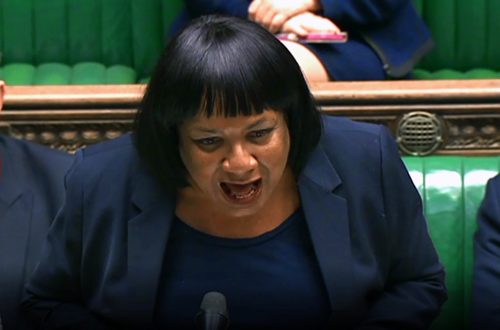If anyone failed to spot a clue as brazen as a bloodied brass candlestick that Ed Miliband is an immature politician unsuited to leading a modern, mainstream centrist social democratic party then the results of a new poll commissioned by The Guardian confirm it.
The clue I’m talking about of course is the ridiculous statement by Ed Miliband at the ‘cuts’ rally in Trafalgar Square on Saturday comparing opposition to ‘cuts’ to the Civil Rights struggle in America or – one’s jaw drops again just thinking about the epic self-delusion – the anti-Apartheid struggle in South Africa.
It must rank as the dumbest analogy a Labour politician has made since Ken Livingstone told the Chinese that Tiananmen Square and Trafalgar Square shared an “interesting” history.
Ed Miliband’s entire strategy, it seems, is based on taking the tempting short cut through quicksand rather than a more robust route back to political relevance. He has tried to harness waves of ragtag far-left anti-Tory agitation, the tempo set by the usual unelectable suspects: The SWP and various other socialist and communist sects too numerous to mention, each with a megaphone and a novelty transitional demand. But, if the wider public thought the SWP or their ilk had anything sensible to contribute, they’d be in power. This would be the moment History threw down for them to seize. But it isn’t.
Perhaps Ed Miliband is too lazy, or has become too infected with the sense of entitlement common in these circles to realise that he has to work to restore his party to power.
A responsible, mature party leader would not be giving the public false hope and unreasonable expectations by playing to the “no cuts” dreamers. He’d be arguing that while cuts – even “savage” ones – do indeed need to be made, the Tories are making the wrong ones, in the wrong places at the wrong time. His arguments would be persuasive and compelling. Instead young Miliband thinks he’s gliding on the wispy breeze of the zeitgeist, but actually he’s plummeting down to the level of street politics. Labour is not a party of revolutionary dreams; it is a party of government. In opposition, it is even more important that it acts like one.
What makes Miliband think that charging around London with placards achieves anything? How many mass marches against Labour where there? Dozens! Marches against Labour’s foreign policy and student riots against university “top-up fees”, to name a few. But Labour didn’t listen and indeed it shouldn’t have. We have a mature democracy. This is not how the national agenda is set.
In fact, some of the SWP placards appearing in recent anti-Tory student demos had already seen service in previous anti-Labour student demos. This fact alone should tell Miliband something. It should sober him up.
It is – as I’ve said – very hard to resist the temptation to try to surf the wave of this anti-government feeling, but Miliband should remember this: the fringe setting the news agenda are not “anti-Tory”, they’re anti mainstream politics. There is nothing to be gained for a mature, responsible, mainstream party in mixing in these fringe circles.
Certainly, most people who joined Saturday’s march who were not far-left nuts. Many people are reasonably worried about losing their public sector jobs, or their social benefits, or are concerned that cuts might affect the arts or community services. Others believe that too many cuts too fast may cause another recession. But these are not the people being heard – and Ed Miliband is not helping them to be heard. Therefore their case is not being made. It is sacrificed to a simplisitic “No Cuts” demand.
However, no sensible person actually believes the “no cuts” position is tenable. What’s more, no sensible person will believe it from a Labour politician. Before the last general election, Labour’s chancellor, Alistair Darling’s stance was reported in The Guardian:
Alistair Darling admitted tonight that Labour’s planned cuts in public spending will be “deeper and tougher” than Margaret Thatcher’s in the 1980s, as the country’s leading experts on tax and spending warned that Britain faces “two parliaments of pain” to repair the black hole in the state’s finances….
Asked by the BBC tonight how his plans compared with Thatcher’s attempts to slim the size of the state, Darling replied: “They will be deeper and tougher – where we make the precise comparison I think is secondary to an acknowledgement that these reductions will be tough.”
Ed Miliband’s entire strategy appears to be one of posturing and dishonesty. He shares platforms with “no cuts” dreamers who claim to offer an “alternative” (which on closer inspection appears to be no more than um, “no cuts”) but offers no credible alternative himself. Certainly, on these populist platforms, if he in fact has any alternative, he’s very coy about what it might be.
This might be because the shouty brigade ousted Aaron Porter, the Labour-supporting NUS leader who tried to take a sensible line instead of screeching and flinging heavy equipment off buildings. But a national leader ought not to take his cue from student politics, so Ed should stop acting like an undergraduate. (Ironically, Porter showed more maturity and leadership.)
Labour will either not be believed or trusted by the majority of people it needs to win over, who know that some cuts are required. Labour will find itself the target of precisely the same anger that it is whipping up at the moment, when it gains power and fails to deliver a “zero cuts” agenda.
Labour must stop appearing to be leveraging anti-cuts feeling to get back into power. Instead it should be leading an honest debate on what can be cut until we’re more flush (the sort of “paining therapy in schools” stuff) and what is vital to retain. Labour’s essential defence of people with disabled children or old age pensioners who need modest help staying independent should not be obscured by louder demands to save some “community radio station” which is only someone’s vanity project.
So now to the Guardian Poll which underscores the good advice to Labour I’m offering above. I’ll cut to the chase:
- Support for the Tories has increased 2 points. Labour has dropped two points.
- Almost 60% of people either support the cuts or in fact don’t think they’ve gone far enough.
Ed Miliband is Labour’s Ian Duncan Smith. Start making plans for a new leader.
The good news for Labour is that the majority of British people are sensible and realistic. A credible Labour leader need not be coy about the need for a period of austere economics while we tackle the deficit.


